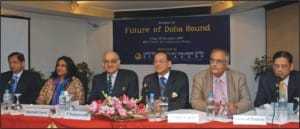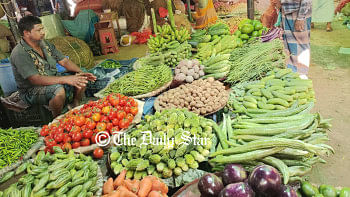Dhaka for free access of all LDC goods to rich nations

(From right) Mustafizur Rahman, executive director of Centre for Policy Dialogue (CPD), Debapriya Bhattacharya, permanent representative of Bangladesh to the WTO and UN offices in Geneva, Iftekhar Ahmed Chowdhury, foreign affairs adviser, Rehman Sobhan, chairman of CPD, Rajani Alexander, acting high commissioner of Canadian high commission, and Shishir Priyadarshi, director (Development Division) of WTO Secretariat in Geneva, are seen at a discussion on 'Future of Doha Round' in Dhaka yesterday.Photo: STAR
The proposed duty free facilities for 97 percent of goods from LDCs make WTO's special and differential (S&D) market access issue a mockery, Foreign Adviser Iftekhar Ahmed Chowdhury said yesterday.
"As we have estimated, more than 60 percent of Bangladesh's export in terms of value can be included in the 3 percent sensitive list and be ineligible for duty-free treatment," the adviser said.
"We need to ensure that all exports from LDCs are granted duty free and quota free access to developed markets," Chowdhury told a dialogue in Dhaka.
In the Hong Kong declaration of WTO (World Trade Organisation) in 2005, the US agreed to give duty and quota free market access for 97 percent of products from LDCs (least developed countries), excluding textiles that account for 42 percent of Bangladesh's total exports.
Centre for Policy Dialogue (CPD) organised the dialogue titled 'Future of Doha Round'. Professor Rehman Sobhan, chairman of CPD, presided the programme.
Dr Shishir Priyadarshi, director (development division) of WTO Secretariat in Geneva, Dr Rajani Alexander, acting high commissioner of Canada, and Debapriya Bhattacharya, permanent representative of Bangladesh to the WTO and UN offices in Geneva, also spoke.
The foreign adviser also said the government should concentrate more on bilateral relations with other WTO members apart from its involvement in multilateral initiatives.
He said he is writing to all the US congressmen individually urging them to consider duty and quota fee market access for Bangladesh's apparels.
He said Bangladesh will project its stances on market access and other WTO issues during the next meeting of World Economic Forum scheduled to be held in Davos in January and the WTO Ministerial Meeting at Lesotho in February.
Painting a gloomy picture of the outcome of negotiations at Doha Development Round that began in November 2001, the foreign adviser said the developing countries welcomed the new round of trade talks believing that it would remove the inequalities of the previous rounds. Six years later, he said, the “Doha Round enlists more skeptics than optimists.”
Iftekhar said even after the Hong Kong Ministerial many trade ministers claimed a win-win outcome. But by July 2006, most of the euphemism disappeared and the talks came to a complete halt, he added.
He said apparently trade negotiations from the EU and the US failed to reach an agreement on reducing farm subsidies. A consensus on NAMA (National Agri-Marketing Association) was also missing, he added.
“In the clash of the Titans, interests of the developing countries, especially that of the LDCs, have taken a backseat. It almost looks like the epitaph 'development' has become the collateral damage,” he said in an apparent pessimistic note.
Debapriya Bhattacharya emphasised the need for identifying products that should be included in the list of duty free access to US and other developed countries.
"US negotiators are currently suggesting us to provide names of those products for duty and quota free market access, which face challenges for liberalisation," Bhattacharya said.

 For all latest news, follow The Daily Star's Google News channel.
For all latest news, follow The Daily Star's Google News channel. 



Comments